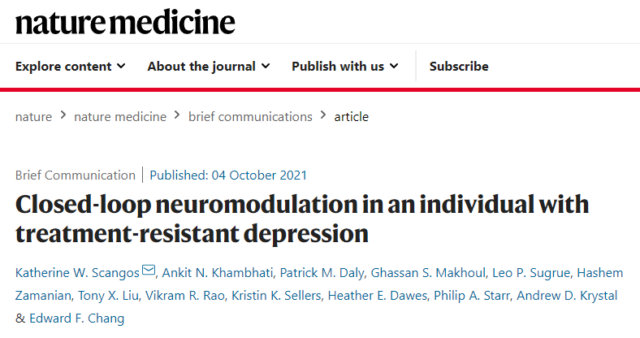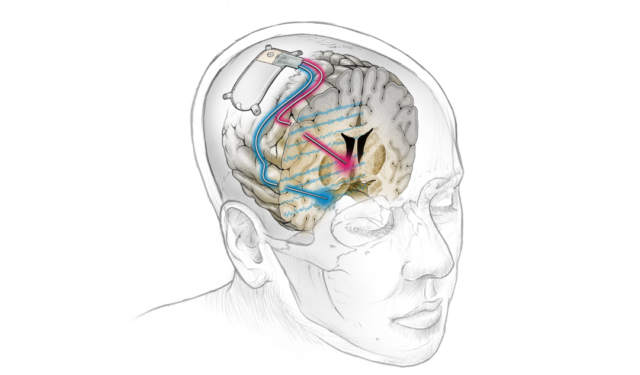The first case in the world: Brain implants successfully treat depression
- Normal Liver Cells Found to Promote Cancer Metastasis to the Liver
- Nearly 80% Complete Remission: Breakthrough in ADC Anti-Tumor Treatment
- Vaccination Against Common Diseases May Prevent Dementia!
- New Alzheimer’s Disease (AD) Diagnosis and Staging Criteria
- Breakthrough in Alzheimer’s Disease: New Nasal Spray Halts Cognitive Decline by Targeting Toxic Protein
- Can the Tap Water at the Paris Olympics be Drunk Directly?
The first case in the world: Brain implants successfully treat depression
- Should China be held legally responsible for the US’s $18 trillion COVID losses?
- CT Radiation Exposure Linked to Blood Cancer in Children and Adolescents
- FDA has mandated a top-level black box warning for all marketed CAR-T therapies
- Can people with high blood pressure eat peanuts?
- What is the difference between dopamine and dobutamine?
- How long can the patient live after heart stent surgery?
The first case in the world: Brain implants successfully treat depression.
Depression (MDD) is a common mental disorder, mainly manifested as depression, decreased interest, slow thinking, poor diet and sleep and other symptoms. MDD patients are associated with cardiovascular disease, diabetes, and Alzheimer’s disease. Related to the increase, the mortality rate is also higher.
Depression (MDD) is a common mental disorder, mainly manifested as depression, decreased interest, slow thinking, poor diet and sleep and other symptoms. MDD patients are associated with cardiovascular disease, diabetes, and Alzheimer’s disease. Related to the increase, the mortality rate is also higher. So far, the cause of depression is not clear.
According to statistics from the World Health Organization, more than 350 million people worldwide suffer from depression, which has become the world’s fourth most common disease, and it is still growing rapidly. WHO predicts that depression will become the number one disease with the global burden of disease in 2030.
On October 4, 2021, researchers from the University of California published a research paper entitled “Closed-loop neuromodulation in an individual with treatment-resistant depression” in the journal Nature Medicine.
The research developed a precision medicine method that successfully treated depression in patients by identifying and regulating brain circuits, paving the way for a new paradigm urgently needed in psychiatry.

At present, deep brain stimulation has been successful in Parkinson’s disease and epilepsy. The results of deep brain stimulation for specific areas of the brain to treat depression have been mixed and mostly disappointing. However, in this study, the researchers made great changes to this treatment.
Researchers manually tracked the location of the patient’s depression in the brain and found a biomarker, a specific brain wave pattern, which was not previously found in major depression, and used it to personalize the machine. Stimulate at the time and place where the biomarker is expressed.
The researchers inserted one electrode lead into the brain area where the biomarker was found, and the other electrode lead was placed in the brain area where the patient’s “depression circuit” is located. It will take a while to determine the best location for symptom relief. Once inserted, the first wire will detect the biomarker, and the second wire will generate a small amount of current deep in the brain area for 6 seconds.

Blue is used to detect biomarkers, red is located in the ventral sac for stimulation
The first author of the study stated that not only did we determine the correct brain circuits and biomarkers, but we were also able to replicate them at completely different stages using implanted devices in the later stages of the trial. This success in itself is an incredible advancement in our understanding of the brain function that causes mental illness.
The researchers emphasized that so far, this new successful result has been achieved in only one patient. There have been many other studies on deep brain stimulation that have not yielded results in trials, and we do not know how this method will develop over time.
It is exciting to stimulate the brain only when symptoms appear, and it is also a new method of using deep brain stimulation in depression. In past studies, stimulation was performed continuously at preset time intervals, rather than when specific depressive brain activity occurred. This in itself may be a huge change that makes the technology more successful.
But this biomarker is probably not universal, which means that researchers need to find the corresponding biomarker for each patient in order to be able to treat them in the same way.
The team is already recruiting more patients to participate in this study to see if they can find more personalized depression markers and provide them with their own specialized treatments.
Paper link:
https://doi.org/10.1038/s41591-021-01480-w
The first case in the world: Brain implants successfully treat depression
(source:internet, reference only)
Disclaimer of medicaltrend.org
Important Note: The information provided is for informational purposes only and should not be considered as medical advice.



